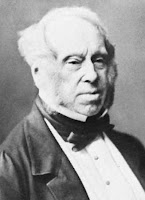A lesson from history
 As everyone is now aware, Britain is by far the most cunning and malevolent of all Iran's enemies. And also one of the most enduring. In explaining Ayatollah Khamanei's remarks the other week, most news outlets drew attention to the UK's role in the toppling of the Mossadeq government in 1953. But that was just one incident among many. There was, for example, a short war in 1856, occasioned partly by what the British saw as Persian meddling in Afghanistan and partly by a diplomatic incident involving the British ambassador in Tehran, whose name was Murray. Murray employed the services of a local man. The prime minister, Sadr Azim, objected - and, when Murray refused to dismiss the man, accused the diplomat of having improper relations with his employee's wife. The truth or otherwise of this allegation I have been unable to establish. But it scarcely matters; after the usual diplomatic protests, the British prime minister Lord Palmerston sent a gunboat and the Iranians were swiftly defeated and forced to back down. Those were the days.
As everyone is now aware, Britain is by far the most cunning and malevolent of all Iran's enemies. And also one of the most enduring. In explaining Ayatollah Khamanei's remarks the other week, most news outlets drew attention to the UK's role in the toppling of the Mossadeq government in 1953. But that was just one incident among many. There was, for example, a short war in 1856, occasioned partly by what the British saw as Persian meddling in Afghanistan and partly by a diplomatic incident involving the British ambassador in Tehran, whose name was Murray. Murray employed the services of a local man. The prime minister, Sadr Azim, objected - and, when Murray refused to dismiss the man, accused the diplomat of having improper relations with his employee's wife. The truth or otherwise of this allegation I have been unable to establish. But it scarcely matters; after the usual diplomatic protests, the British prime minister Lord Palmerston sent a gunboat and the Iranians were swiftly defeated and forced to back down. Those were the days.The following year, Sadr Azim sent Palmerston a flowery letter, protesting that he had always valued and promoted friendship with Britain. This drew forth a marvellous riposte:
...So far from your Excellency having been alone in endeavours to preserve friendship between the two governments, your Excellency was the main and principal cause of the cessation of that friendship. I have no doubt that your Excellency, in seeking a quarrel with England, believed that you were promoting the interests of Persia, and I am bound to suppose that your Excellency considered yourself as performing on that occasion the part of a true patriot; and this belief on my part strengthens my confidence in the future maintenance of friendship between the two governments and the two countries, because the events of the war, and the decisive victories obtained by the British troops over superior numbers of Persian troops, must have shown and proved to the sagacious mind and powerful understanding of your Excellency that the true interests of Persia are best promoted by peace and friendship with England, and that the sure results to Persia of war with England would be defeat and disaster.
With every wish for the health and happiness of your Excellency, and with a fervant hope that the reign of your illustrious master the Shah may be long and prosperous, I have the honour to remain your Excellency's most obedient and faithful servant,
PALMERSTON
Compare and contrast the impotence, ineffectiveness and desultory prose David Miliband's response to Iran's arrest of today's British embassy employees in Tehran.
Comments